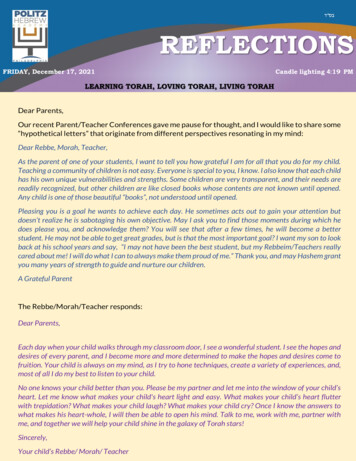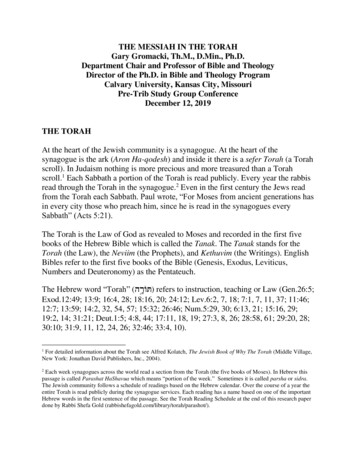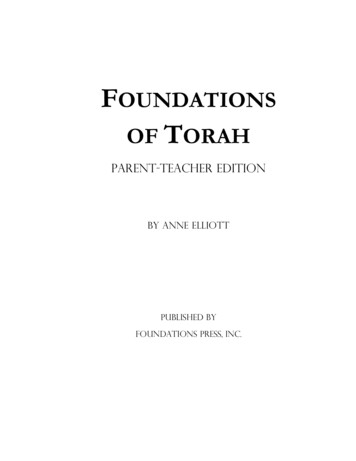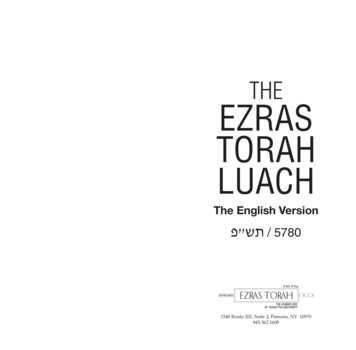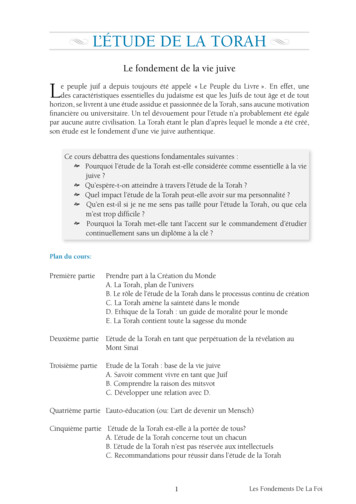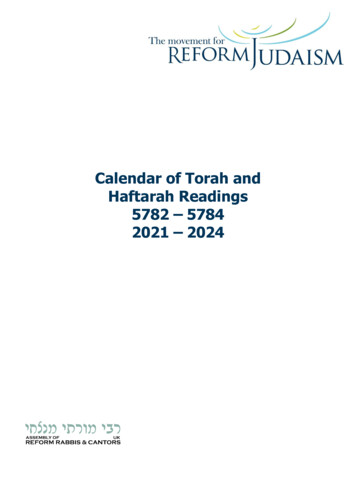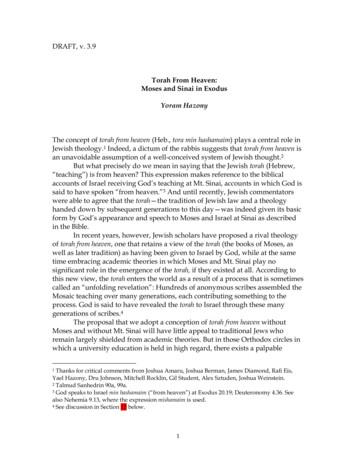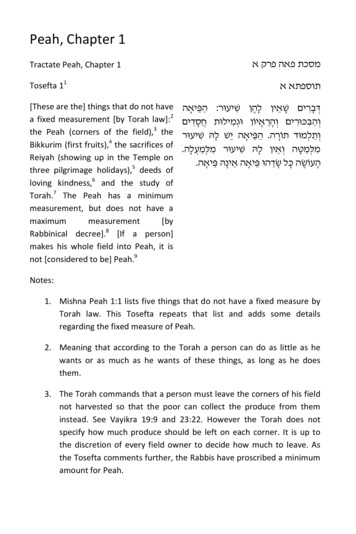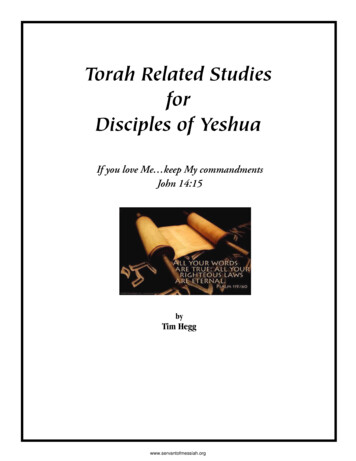
Transcription
Torah Related StudiesforDisciples of YeshuaIf you love Me keep My commandmentsJohn 14:15byTim HeggTorahResource.comwww.servantofmessiah.org
Table of ContentsSession One: The Torah of Adonai — Psalm 19:7–11 . . . . . . . . . . . . . . . . . . . . . . . . . .Page 3Session Two: What is the New Covenant and Does it Replace the Torah? . . . . . . . . . .Page 9Session Three: Has God’s Way of Salvation Always Been the Same? . . . . . . . . . . . . .Page 13Session Four: Is the Torah Divided (Moral, Ceremonial, Civil)? . . . . . . . . . . . . . . . .Page 19Session Five: Acts 15: Is the Torah Only for the Jews? . . . . . . . . . . . . . . . . . . . . . . . .Page 25Session Six: Did Paul Give Up the Torah (1Corinthians 9:19–23) . . . . . . . . . . . . . . .Page 31Sessions Seven & Eight: Does the Indwelling Spirit Replace the Torah? . . . . . . . . .Page 37Session Nine: Jews and Gentiles in the Body of Messiah . . . . . . . . . . . . . . . . . . . . . .Page 51Session Ten: How Did We Get Off Track? . . . . . . . . . . . . . . . . . . . . . . . . . . . . . . . . . .Page 59Session Eleven: Battle Lines: The Scriptures. . . . . . . . . . . . . . . . . . . . . . . . . . . . . . . .Page 69Session Twelve: Battle Lines: Yeshua . . . . . . . . . . . . . . . . . . . . . . . . . . . . . . . . . . . . .Page 79Session Thirteen: Living Torah: Leaders & Teachers . . . . . . . . . . . . . . . . . . . . . . . . .Page 89Session Fourteen: Living Torah: Building a Community . . . . . . . . . . . . . . . . . . . . . .Page 95Session Fifteen: Living Torah: The Festivals. . . . . . . . . . . . . . . . . . . . . . . . . . . . . . . .Page 99Copyright TorahResource 2005All rights reservedFor information regarding the copying and use of this material,please contactTorahResource.comvia siah.org
Session OneThe Torah of Adonai – Psalm 19:7–11Introduction: The Overall Structure of the PsalmThe Psalm divides nicely into three sections: Verses 1–6: The Revelation of God through observing His created world Verses 7–11: The Revelation of God in His written word (the Torah) Verses 12–14: The Application of God’s revelation to the life of the believerSection 1: The Glory of God is revealed in His creation The vast expanse of the heavens gives witness to all mankind The heavenly bodies (sun, moon, stars) consistently regulate time in the universe The greatness of the luminaries reveals the power of GodSection 2: The Salvation of God is revealed in His inspired word (the Torah – God’s teaching) The Torah touches every aspect of life The Torah gives God’s way of regulating life as He ordained it The majesty of the Torah reveals the love of GodSection 3: The child of God is known by his or her willingness to apply the Torah to life The child of God is warned about that which would bring trouble The child of God is rewarded when he or she obeys God’s Torah The child of God learns the joy of forgiveness from God’s Torah The child of God grows in love for God as he or she learns of God in the TorahThe Heart of the Psalm: The Value of God’s Torah (Teaching) Verses 7–11The poetic parallelism of these verses is quite obvious. In each of the first four lines, a statement is maderegarding the character of God’s Torah, and then its effect in the life of a child of God.Characteristic of the TorahThe Torah of the LORD is perfectThe Testimony of the LORD is sureThe Precepts of the LORD are rightThe Commandment of the LORD is pureEffect of the Torah Upon the Individualrestores the soulmakes the simple wisemake the heart rejoiceenlightens the eyes3www.servantofmessiah.org
43rd Annual Conference – Asia Pacific Messianic FellowshipThe next four lines of this section of the Psalm establish four more characteristics of the Torah followedby four statements regarding the value of the Torah:Characteristic of the TorahThe Fear of the LORD is cleanThe Judgments of the LORD are trueThe Torah is more desirable than goldThe Torah is pleasurable (sweeter than honey)Value of the TorahIt is eternal (enduring forever)It is completely righteous (righteous altogether)It has extreme value (more than fine gold)It offers full satisfaction (sweeter than even the bestpart of the honeycomb)We will understand the tremendous message of this Psalm regarding the Torah, if look more closely ateach of the Hebrew terms found in the section under study. First, we should note that the Psalmist uses anumber of different terms when he speaks of the Torah:EnglishTorah ew ( תּוָֹרה torah) ‘( ע ֵדוּת eidut) ( פּ ִקּוִּדים piqudim) ( מִצ ְו ָה mitzvah) ( יְִרא ָה yir’ah) שׁפָּט ִים ְ ִ ( מ mishpatim)Meaningfrom the root יָָרה , “to point out,” “to teach,” “instruction”meaning “witness,” thus, that which gives witness to God’s truthmeaning “instructions, proper procedures”meaning “commandment,” “commission to a specific task”meaning “fear,” “reverence,” “respect,” “awe”meaning “law,” “legal judgment,” what is right or proper incontrast to what is unlawful or improperEach of these terms are used to identify the Torah of the LORD, and as such, each of the terms gives usadditional insight into the nature of the Torah. Thus, the Torah of God is: His direct Teaching. In His mercy He has given us His instructions for living. Since He is our Creator,He knows our weaknesses, and He knows what is best for us. By giving us His Torah, He hasprovided us with instructions so that we can live life to the fullest, because we know what is rightand what is wrong. A Witness of God’s own character. Since the Torah gives to us God’s own teaching, it also reveals to usthe person and nature of God Himself. If we want to know God, we will study and obey His Torah. Procedures for every aspect of life. God created us to live upon this earth. Through His Torah, we aregiven principles that work in life. If we follow His instructions, we can expect them to work for Hisglory and our good. Commandment: By knowing and obeying God’s commandment, we know who He is, who we are inrelationship to Him, and what our purpose is in life (i.e., to love God and to love our neighbor). The way to demonstrate a true Fear of God: The Torah has no value for those who have no relationshipwith God. For those who are not bound by covenant to the One Who gave the Torah, it is considereda burden or restricting one’s freedom. To those who have come to fear God, the Torah is received asthe loving instruction of a Father Who intends to bless us.www.servantofmessiah.org
3rd Annual Conference – Asia Pacific Messianic Fellowship 5God’s Judgments regarding what is right and what is wrong: we are not left to determine a standard ofwhat is proper or improper; what is legal or illegal; what is right or wrong. God has revealed to usHis standards for righteous living.Thus, the very terms used by the Psalmist to refer to the Torah reveal the essential nature of the Torah.The Psalmist also adds additional characteristics of the Torah to more fully explain its nature:EnglishPerfectHebrew תָּמ ִים , tamiymSure אָמַן , ’amanRight יָשָׁר , yasharPure בּ ָר , barMeaning“complete,” “without fault” (same word used of sacrificial animals whichwere to be “without blemish”), “impeccable,” “honest”“that which endures,” “steadfast,” “immovable,” “permanent,” “reliable,”“faithful,” that which can always be trusted“straight,” “proper,” “upright,” “just,” turning neither to the right or to theleft; always on track“without admixture,” “unsoiled,” “pristine”From these words we learn much about God’s Torah: We never need fear that God’s Torah will lead us in a harmful path. Everything that God has givento us in His instructions is good for us. Every part of the Torah comes from God Who is Himself“perfect.” God’s Torah is not temporary, or applicable only for a period of time. It “endures forever,” becauseit is the eternal word of the Eternal One. It is “permanent” and “steadfast” – “immovable.” God’sinstructions work in all times, for all people, in all cultures. It doesn’t change. We can always counton it to be the same. Times change, and cultures change, but mankind’s basic nature remains the same. Thus, God’s Torah isalways on track—it is always “right” because God gave the Torah to match the needs of His people. We don’t need to analyze the Torah to pick what is “good” and avoid what is “bad.” The Torah onlycontains what is “pure” and therefore good for us. We dare not lean on our own understanding.Rather, in all our ways, when we acknowledge His way, we may trust that it is right.But the Psalmist also gives additional descriptions to describe how the Torah assists the believer. These aregiven in four phrases which may be grouped (through poetic parallelism) into two:Englishrestoring the soulHebrew שׁוּב , shuv, “return;” נֶפ ֶשׁ , nefesh, “soul”makes the simple wise חָכ ַם , chakam, (hif) “make wise”makes the heart rejoiceenlightens the eyes פֶּת ִי , petiy, “young,” “naive” שׂמַח ָ , samach, “rejoice,” “happy”MeaningWhen we get off track, the Torah is a means ofpointing us back to God, to His ways, and to HisMessiah.The Torah is a source of great wisdom, because itwas given to us by the all-wise, all-knowing One.When we walk in the ways of Torah, we discoverthe true joy of life, lived in the presence of God. ל ֵב , leiv, “heart,” “inner self” א ָו ַר , ’avar, “be light,” “make light” The Torah gives us insight into the difficult ע ַי ִן , ‘ayin, “eye”www.servantofmessiah.orgdecisions of life. Its precepts help us make the rightdecisions.
63rd Annual Conference – Asia Pacific Messianic FellowshipOnce we come to realize that the Torah is the self-revelation of the unchanging, eternal God, welikewise appreciate its great value and worth. The Psalmist gives four more descriptions of the Torah thataffirm its true value:EnglishCleanTrueDesirableSweetHebrewMeaning טָהוֹר , tahor, “ceremonially clean” The Torah is perfectly suited for those who desire toplease God; it contains His way of service/worshipThe Torah remains the same from day to day, and אֶמ ֶת , ’emet, “trustworthy,”from generation to generation“constant,” “faithful”When one realizes the value of Torah, it becomes חָמַד , “to treasure something”one’s greatest treasureTo those who draw close to God, the Torah is מָתוֹק , “sweet,” “pleasant”pleasing; it satisfies one’s spiritual longingTo these, the Psalmist adds two more descriptions of the Torah in terms of its existence within God’suniverse:EnglishEndures foreverRighteous altogetherHebrew עוֹמ ֶֶדת לָע ַד , ‘omedet la‘ad צ ְָדקוּ יַחְד ָּו , tzadequ yachdaivMeaningThe Torah, as the Torah, remains or “stands” foreverThe Torah is not self-contradictory. All of its partsare perfectly woven together to present a righteousway of livingThese descriptions of the Torah extol its functionality within the lives of God’s chosen people.Describing the Torah as “ceremonially clean” emphasizes its use in the worship of God. In the same waythat only a “clean” animal could be offered as a sacrifice, so the Torah presents itself as the acceptable normor halachah for those who wish to “draw near” to the Almighty. But it is also noteworthy that the Psalmistcombines “endures forever” with his description of the Torah as “ceremonially clean.” This teaches us thatthe Torah endures or remains the pattern of life for the righteous throughout all the generations of God’speople. This concept corresponds to Yeshua’s words in Matt 5:17–20, in which He teaches the eternal natureof the Torah.Furthermore, when the Psalmist describes the Torah as “true” ( אֶמ ֶת , ’emet), it emphasizes the covenantnature of the Torah. ’emet is often combined with the Hebrew word ( חֶס ֶד chesed, “lovingkindness”) todenote “covenant faithfulness” and is found in covenant contexts (cf. Gen. 24:27, 49; 47:29; Ps 89:14). Godgave the Torah as a covenant to Israel, and as such, He remains faithful to it as an enduring covenant. Tosuggest that the Torah has been abolished or rendered ineffective is likewise to suggest that God has brokenHis covenant with Israel. This would impugn His faithfulness.But our Psalm teaches just the opposite. The Psalmist combines “righteous altogether” with hisdescription of the Torah as “true.” By this he means that as a single unit, God maintains the Torah as Hiscovenant with Israel and He does so because of His righteousness. So the foundation of the enduringwww.servantofmessiah.org
3rd Annual Conference – Asia Pacific Messianic Fellowship7value of the Torah is the very righteous nature of the Almighty. To teach that the Torah has been abolishedimpugns the righteousness of God.Finally, having described the Torah in all of its eternal attributes, the Psalmist relates how God’speople view the Torah. First, he describes it as a “treasure” of great value, worth more than the finestgold. Accepting the Torah as the eternal revelation of God’s very character, and as the loving instructionof our King, we realize that it is far more valuable than any material treasures we may possess. For it isin following the righteous ways of God’s instructions that we are able to enjoy to the fullest those earthlypossessions also given to us by the Almighty.Secondly, as we come to appreciate the Torah as a great treasure, we realize how much it satisfies ourdeepest longings, for it reveals to us the manner in which God desires to dwell with us—it constantly pointsus to His Messiah, and the way of salvation He has secured for His people. When we feed upon the Torah,we find out how sweet it really is. This parallels how the Psalmist describes the function of the Torah inour personal lives. It “restores the soul,” meaning that on the path of life, the Torah constantly teaches andreminds us of God’s ways. Thus, it causes us to return our thinking back to align with God’s thoughts. Itgives instruction to us, so that where we are ignorant or naive, it instructs us in God’s way of living. In sodoing, in causes the heart to rejoice. Apart from God’s light, we wander in the darkness—we loose our way.But when the light of the Torah shines forth, we are able to find our way back to Him, and in so doing, weexperience genuine joy and contentment. “In Your light (Torah), we see light” (Ps 36:9).With these truths about the Torah in mind, the Psalmist concludes this Psalm with a recognition ofhis own weakness, and the manner in which the divine revelation of God assists and guides him. He is“warned” ( זָה ַר , zahar) about those things that would be harmful, or would cause him to act contrary to God’swill. He notes that in keeping them there is “great reward” ( ע ֵֶקב ָרב , ‘eiqev rav). “Reward” here may havethe sense of “wages,” or what one receives at the end of a day’s labors. The Psalmist views his life as ajourney, and he realizes that the Torah gives him the way to walk, and promises to bring him to his desireddestination. As such, the Torah guides him to the place of his final “reward.”Yet the Psalmist also recognizes his own weakness. Even though he possesses the very instructionsof God in the Torah, he knows that he doesn’t know it perfectly, nor is he able to following it perfectly.As such, he recognizes that he is still left to God’s mercies and forgiveness. He pleads for God’s helpin acquitting him from “hidden” things, that is, those things that he is unaware of because of his lack ofunderstanding. In his weakness, he asks for God’s mercy. But he also requests that God should keep himfrom “presumptuous sins,” meaning sins that flow from a heart of pride. Even though the Psalmist has theTorah, he recognizes his own weakness to keep it as he desires.He therefore concludes the Psalm with a pronouncement of his faith in God as he humbly approachesHim as Fortress (Rock) and Redeemer: “Let the words of my mouth and the meditation of my heart beacceptable in Your sight, O LORD, my rock and my Redeemer.” In understanding the Torah for what ittruly is, the Psalmist is brought back to a full reliance upon God as the One Who protects and redeems. ThePsalmist in no way suggests that he could earn his own righteousness, or somehow secure his own salvationbefore God. The Torah has taught him this, for it teaches the need for sacrifice (shedding of blood) in theface of transgressions. Therefore, receiving the Torah as the treasure of God’s own revelation, he seeks towww.servantofmessiah.org
83rd Annual Conference – Asia Pacific Messianic Fellowshipwalk in its ways as an expression of his love for God, while at the same time pleading for God’s help andmercies in the view of his own weaknesses.SummaryExpanded Paraphrase as Commentary: Psalm 19:7–11The Instructions for living righteously that God has given us are completely without defect,and as result, they bring us back onto the path of right living when we have strayed or found ourselves lost.As we grow and mature in our relationship with God,His Instructions for living are the source of true knowledge.God has given witness of Himself to us in His Instructions for living,and thus these Instructions are steadfast, reliable, and unchanging,because God Himself is steadfast, reliable, and unchanging.This means that His Instructions for living meet the genuine needs of mankindfrom generation to generation, in every culture, and in every circumstance.In God’s Instructions for living, we find His specific teaching and procedures for all issues of life,and these procedures, when followed, bring success in the various issues we face in our lives.As a result, when we follow what God has given us in His Instructions for life,we find true happiness and joy.God’s Instructions for life tell us what we should do, and what we should not do.They offer to us wisdom and instruction that we otherwise would never know.God’s Instructions for living teach us about God Himself,and cause us to marvel at His greatness,forming within our own hearts a deep fear and respect for His majesty.We come to recognize in these Instructions for livingthe manner in which we may have close and enduring fellowship with Him.In fact, in these Instructions for living, we come to appreciate the covenant relationship we have with Him.We see in them God’s way of looking at things,and we realize that these Instructions for living are a complete revelation of what it means to liverighteously.When we realize how precious His Instructions for life are,we recognize that they are more valuable to us than anything else we possess.Moreover, we come to love and desire His Instructions for lifebecause they are sweet like honey.They are not a burden whatsoever,but we long to feed on them more and more.www.servantofmessiah.org
Session TwoWhat is the New Covenant and Does It Replace the Torah?It has been the a standard teaching throughout the centuries of the Christian Church that the NewCovenant, established by Yeshua’s death and resurrection, has replaced the Torah. This teaching has alsoresulted in dividing the Scriptures into two parts, usually labelled the “Old Testament” and the “NewTestament,” which is just another way of saying “Old Covenant” and “New Covenant.” Accordingly, the“New Testament” forms the primary Scriptures for the believer in our times, with the “Old Testament” onlyproviding background and illustration for what the “New Testament” explicitly teaches. It is not uncommonto hear the slogan: “the New is in the Old contained; the Old is by the New explained.” As a result, manyChristians would hold the position that they are required to obey what the “New Testament” teaches, andthat the requirements of the “Old Testament” are no longer applicable, but were for a bygone era.But is this an accurate understanding of the New Covenant? Is the New Covenant a replacement for theTanach (the Torah, Prophets, and Writings)? If we honestly intend to seek a biblical answer to this question,we must study what the Bible itself says about the New Covenant. The only time the Tanach speaks of theNew Covenant is in Jeremiah 31:31–34:31 “Behold, days are coming,” declares the LORD, “when I will make a new covenantwith the house of Israel and with the house of Judah,32 not like the covenant which I made with their fathers in the day I took them by thehand to bring them out of the land of Egypt, My covenant which they broke, althoughI was a husband to them,” declares the LORD.33 “But this is the covenant which I will make with the house of Israel after thosedays,” declares the LORD, “I will put My Torah within them and on their heart I willwrite it; and I will be their God, and they shall be My people.34 “They will not teach again, each man his neighbor and each man his brother,saying, ‘Know the LORD,’ for they will all know Me, from the least of them to thegreatest of them,” declares the LORD, “for I will forgive their iniquity, and their sin Iwill remember no more.”The New Covenant is made with the House of Israel and the House of Judah from Jeremiah’s perspective, the New Covenant was still future the New Covenant is national in its scope: it pertains to the physical offspring of Jacob and to thosefrom the nations who have joined her through faith in her MessiahThe New Covenant would be enacted at a time when Judah and Israel are reunited v. 33 – “This is the covenant which I will make with the house of Israel” – whereas at first Jeremiah9www.servantofmessiah.org
103rd Annual Conference – Asia Pacific Messianic Fellowshipnames both the house of Judah and the house of Israel, he concludes by naming only the house ofIsrael. By this we understand that he saw the reuniting of Judah and Israel into a single nation onceagain.The New Covenant will be different than the covenant enacted at Sinai v. 32 – “not like the covenant which I made with their fathers in the day I took them by the hand tobring them out of the land of Egypt, My covenant which they broke ” as the next verses show, however, the contrast is not in the covenant itself, but in the manner inwhich Israel receives the covenant. The nation rebelled against the covenant given at Sinai, but theNew Covenant will be fully received and embraced by the nation of Israel. As far as God is concerned, the covenant He made with Israel at Sinai is eternal (Ex 31:16; Lev24:8). The nation herself may be unfaithful, and forfeit the blessings of the covenant, but thecovenant itself remains intact because of God’s promise.The New Covenant will be different because it will be written on the heart of Israel v. 33 – “I will put My Torah within them and on their heart I will write it ” God does not have two Torahs! When He refers to “My Torah,” He means the eternal revelation Hegave to Moses on Mt. Sinai. The same Torah against which Israel rebelled will be the Torah that iswritten upon her heart, the evidence of her new heart will be that she will obey God’s statutes andordinances. Only God can change the heart, and He promises to do so for Israel. We read in Ezekiel a passagewith a number of similarities to the Jeremiah prophecy of the New Covenant:Ezekiel 11:17 “Therefore say, ‘Thus says the Lord GOD, “I will gatheryou from the peoples and assemble you out of the countries amongwhich you have been scattered, and I will give you the land of Israel.”’18 “When they come there, they will remove all its detestable thingsand all its abominations from it. 19 “And I will give them one heart,and put a new spirit within them. And I will take the heart of stone outof their flesh and give them a heart of flesh, 20 that they may walk inMy statutes and keep My ordinances and do them. Then they will beMy people, and I shall be their God.The New Covenant will be different because her obedience to God will be on a national scale v. 34 – “ for they will all know Me, from the least of them to the greatest of them” to “know the LORD” does not mean to “know about the LORD,” but to have close and intimatefellowship with Him in the context of a covenant. Note that God portrays His relationship with Israelas that of a marriage covenant: v. 32, “I was a husband to them.”www.servantofmessiah.org
3rd Annual Conference – Asia Pacific Messianic Fellowship11The New Covenant will be based upon God forgiving Israel of her sin v. 34 – “for I will forgive their iniquity, and their sin I will remember no more.” Forgiveness of sin is only possible through the eternal sacrifice of Yeshua: Acts 4:12 “And there issalvation in no one else; for there is no other name under heaven that has been given among men bywhich we must be saved.” Acts 10:43 “Of Him all the prophets bear witness that through His nameeveryone who believes in Him receives forgiveness of sins.” Heb. 9:22 “And according to the Torah,almost all things are cleansed with blood, and without shedding of blood there is no forgiveness.” Thus, the New Covenant will be fulfilled in Israel at a time when as a nation, she turns to Yeshua infaith, and receives through Him forgiveness of sin.This means that the New Covenant is not yet fulfilled the dispersed people of Israel have not yet been reunited as a single nation Israel, as a nation, has not yet evidenced an obedience to God in faithfulness Israel, as a nation, has not yet turned to Yeshua as the true Messiah, in order to receive forgiveness ofsinsThe characteristics of the New Covenant are evident in the lives of all true believers In every generation, God has proven His faithfulness to His promises by preserving a remnant of Hispeople: Rom. 9:27 ‘Isaiah cries out concerning Israel, “Though the number of the sons of Israel belike the sand of the sea, it is the remnant that will be saved”’ This remnant is comprised of both Jews and non-Jews whom God has drawn to Himself, and whohave been saved by faith in Yeshua. All of the remnant have the Torah written on their hearts, desire to be faithful to God, and seek toobey Him by walking in His ways. As such, the remnant comprises the first fruits of the eventual harvest. The remnant participates inthe realities of the New Covenant in anticipation of its future fulfillment in the nation of Israel.The New Covenant does not replace the Torah, it establishes the Torah Rom. 3:31 Do we then nullify the Torah through faith? May it never be! On the contrary, weestablish the Torah. The New Covenant anticipates the time when the regathered nation of Israel is given a new heartupon which is written the Torah. This will be the result of Israel’s repentance and faith in herMessiah, Yeshua. In every generation there has existed, and exists today, a remnant of believers who evidence thegenuine characteristics of the New Covenant: faithfulness to God through the Torah that is written ontheir hearts, having had their sins forgiven through faith in Yeshua. The remnant exists as the first fruits of the eventually final harvest, that is, the full salvation of Israel.www.servantofmessiah.org
123rd Annual Conference – Asia Pacific Messianic FellowshipConclusion: All who are New Covenant members have the Torah written on their heart As followers of Yeshua, we participate in the New Covenant of which He is the mediator Therefore, our lives should be characterized by obedience to the Torah that has been written on ourhearts. As believers in Yeshua, and thus New Covenant members, we are part of the faithful remnant ofIsrael, having been baptized into the same “body” by the same Spirit.Noteswww.servantofmessiah.org
Session ThreeHas God’s Way of Salvation Always Been the Same?IntroductionIt is not uncommon to find the teaching that before the coming of Yeshua, people were saved by keepingthe Law, while after the death and resurrection of Yeshua, salvation was offered as a gift of faith. But thisway of thinking 1) misunderstands what salvation is in the first place, and 2) fails to reckon with the clearteaching of the Scripture. When we understand God’s way of salvation as given to us in the Scriptures, wewill see that God has always saved sinners as matter of His sovereign grace, based upon the sacrifice ofYeshua as payment for sin, applied to the sinner through faith.Mankind’s Dilemma: The Holiness of God and Mankind’s Sin The high cost of our salvation (covenant fellowship with God) results from God’s holiness– God never changes: His attributes are perfect and infinite– This means His holiness is infinite and eternalIsaiah 6:1–7 as a picture of God’s holiness and His method of salvation1 In the year of King Uzziah’s death I saw the Lord sitting on a throne, lofty andexalted, with the train of His robe filling the temple. 2 Seraphim stood above Him,each having six wings: with two he covered his face, and with two he coveredhis feet, and with two he flew. 3 And one called out to another and said, “Holy,Holy, Holy, is the LORD of hosts, The whole earth is full of His glory.” 4 And thefoundations of the thresholds trembled at the voice of him who called out, whilethe temple was filling with smoke. 5 Then I said, “Woe is me, for I am ruined!Because I am a man of unclean lips, And I live among a people of unclean lips; Formy eyes have seen the King, the LORD of hosts.” Isaiah’s vision of the Almighty– He is the Master (Lord) of His people [note that the vision is cast within the Temple]– He is the King: “sitting on His throne” Ark of the Covenant (cf. Ps 80:1, “enthroned upon thecherubim;” also Is 37:16).– He is majestic: “high and lifted up”– He is unapproachable “smoke filled the Temple” incense Seraphim covered their faces (essence of one’s being) and feet (creaturely attributes)13www.servantofmessiah.org
143rd Annual Conference – Asia Pacific Messianic Fellowship He is infinitely holy and glorious:– “Holy, holy, holy”– “the whole earth is filled with His glory”When Isaiah saw the glory of God, he immediately recognized his own sinfulness– “woe is me, surely I am destroyed” ( דָמַה , damah, “to be silent, cease to exist”)– “I am a man of unclean lips” my whole inner being is unclean, cf. James 3:1ff)– “I dwell among people of unclean lips” all of mankind is essentially unclean– the r
number of different terms when he speaks of the Torah: English Hebrew Meaning Torah (Law) הרָוֹתּ (torah) from the root הרָָי, "to point out," "to teach," "instruction" . the Torah endures or remains the pattern of life for the righteous throughout all the generations of God's people. This concept corresponds to .

